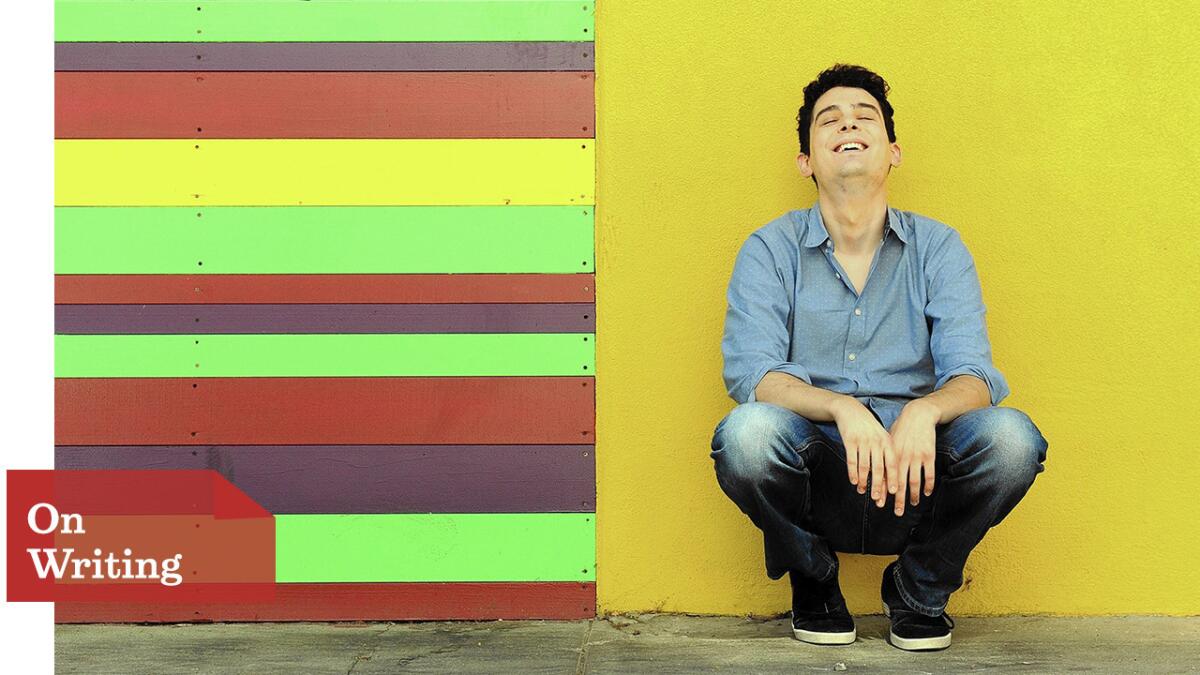Before writing and directing ‘Whiplash,’ Damien Chazelle lived it

- Share via
I like movies that are specific. Movies that home in on a very specific subculture, a specific discipline, a specific world. I started off making documentaries in school, so maybe that’s where it comes from — watching stuff like “Salesman” for the first time and discovering that it wasn’t just about a few Bible salesmen going door-to-door in the ‘60s but that it was about America and what it means to be American. I do truly believe that the smallest stories can wind up being the biggest, because it’s through the specific that a writer can best access the universal.
All this is to say that when I decided to write a movie about my experiences as an aspiring big band jazz drummer, I hoped that by zeroing in on a world I had lived in and showcasing the details that were particular to that world — the ticking clocks of the rehearsal rooms, the padded soundproofing of the practice booths, the trombonists emptying spit valves, the popped blisters and bleeding hands — I might be able to examine how that world reflected America as a whole.
Maybe I could also get at a few bigger questions: At what cost greatness? What does that word even mean — “greatness”? And what does it do to the minds of young people, those who are still searching for their place in society?
This was by far the most personal thing I’d ever written. I’d spent about five years of my life utterly devoted to jazz drumming, and I wanted to tap into the obsessiveness of that mind-set. Every hour of every day during those years I’d thought about nothing but drums and the raw technique I was desperately trying to master.
In school, I rehearsed, performed and traveled with the competitive jazz ensemble — led by a conductor who scared the hell out of me — and when at home I would lock myself in my basement and practice for six to eight hours a day. My hands were constantly blistered or bloody, my ears were always ringing, I tore through drumheads and drumsticks like there was no tomorrow.
Jazz drumming was my life — and it was both joy and agony. That that world now seemed to me as a writer so esoteric, so specific, was exactly the point: Jazz drums had become a bubble for me in those years, divorced from the outside world, and that tunnel vision had only heightened the intensity I felt day in and day out. … It all sounds insane — because, in a way, it was.
I guess art itself is insane. Its actual function is rarely clear, and yet people give their hearts and souls and lives to it, and have for all of history. Maybe it’s that burning desire to leave something behind, to be remembered. At one point in the movie, the lead character, aspiring drummer Andrew Neyman, declares that he’d give up everything if it meant he could be talked about at a dinner table, by people he’s never met, at some point in the future. We shudder and maybe laugh, because the kid is totally nuts. But I think there’s a part of every artist that can relate.
I certainly recognize those flashes of insanity within myself today. But with this movie I wanted to be very critical of the ends-justifying-the-means mind-set. I wanted to show the ways it could be pushed into abuse. As I was in the cutting room, it felt like the movie we were making could be read as either a total condemnation of a certain kind of arts education — the idea that “greatness” can be codified and bottled up and taught, and that in the case of an abusive instructor the ends therefore justify the means — or a celebration of an artist’s (perhaps necessary) insanity. I purposefully made the behavior on-screen as repellent as possible, so as to make the film’s ending harder to grapple with — the saddest “happy ending” I could imagine.
There are obviously other ways to be an artist. But as crazy and misguided and unforgivably cruel as Andrew becomes — I really do see this as a fundamentally sad movie — I think he gets one thing right: Art is and always should be irrational.
More to Read
From the Oscars to the Emmys.
Get the Envelope newsletter for exclusive awards season coverage, behind-the-scenes stories from the Envelope podcast and columnist Glenn Whipp’s must-read analysis.
You may occasionally receive promotional content from the Los Angeles Times.










